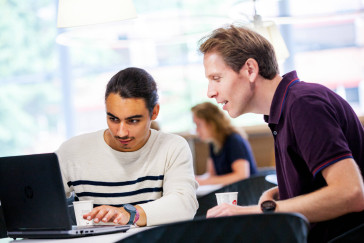Steeds meer leerlingen groeien op met een andere taal dan het Nederlands. Zij krijgen onderwijs in een taal die niet hun eerste taal is. Op het gebied van toetsing brengt deze situatie uitdagingen met zich mee. Meertalige leerlingen kunnen, bijvoorbeeld in het rekenonderwijs, niet hun volledige potentieel aantonen wanneer zij beoordeeld worden in een taal die zij nog aan het verwerven zijn. Functioneel Meertalig Assessment (FMA; De Backer et al., 2017) biedt een mogelijke oplossing voor dit validiteitsprobleem, omdat FMA kennis en vaardigheden van leerlingen via een pallet aan evaluatievormen (bijv. toetsen, observaties, gesprekken) en via hun meertalige repertoires zichtbaar maakt. De daadwerkelijke toepassing van FMA staat echter nog in de kinderschoenen (De Backer, 2020). In de huidige studie verkenden we daarom hoe onderwijsprofessionals vormgeven aan en leren over deze nieuwe benadering van toetsing en in hoeverre een Lesson-Study-aanpak daarbij ondersteunend is. Professionals (N=15) van vijf basisscholen die onderwijs verzorgen aan jonge nieuwkomers voerden samen met een procesbegeleider (N=4) een zogenaamde Assessment Study uit. Een analyse van de FMA-praktijken die deze Assessment-Study-teams ontwikkelen en inzichten uit reflecties van deelnemers op het Assessment-Study-proces laten zien dat een Lesson-Study-methodiek onderwijsprofessionals een effectief kader biedt bij het ontwikkelen van en leren over FMA.
DOCUMENT

Formative assessment (FA) is an effective educational approach for optimising student learning and is considered as a promising avenue for assessment within physical education (PE). Nevertheless, implementing FA is a complex and demanding task for in-service PE teachers who often lack formal training on this topic. To better support PE teachers in implementing FA into their practice, we need better insight into teachers’ experiences while designing and implementing formative strategies. However, knowledge on this topic is limited, especially within PE. Therefore, this study examined the experiences of 15 PE teachers who participated in an 18-month professional development programme. Teachers designed and implemented various formative activities within their PE lessons, while experiences were investigated through logbook entries and focus groups. Findings indicated various positive experiences, such as increased transparency in learning outcomes and success criteria for students as well as increased student involvement, but also revealed complexities, such as shifting teacher roles and insufficient feedback literacy among students. Overall, the findings of this study underscore the importance of a sustained, collaborative, and supported approach to implementing FA.
DOCUMENT

A growing number of higher education programmes in the Netherlands has implemented programmatic assessment. Programmatic assessment is an assessment concept in which the formative and summative function of assessment is intertwined. Although there is consensus about the theoretical principles of programmatic assessment, programs make various specific design choices, fitting with their own context. In this factsheet we give insight into the design choices Dutch higher education programmes make when implementing programmatic assessment.
DOCUMENT

Due to the existing pressure for a more rational use of the water, many public managers and industries have to re-think/adapt their processes towards a more circular approach. Such pressure is even more critical in the Rio Doce region, Minas Gerais, due to the large environmental accident occurred in 2015. Cenibra (pulp mill) is an example of such industries due to the fact that it is situated in the river basin and that it has a water demanding process. The current proposal is meant as an academic and engineering study to propose possible solutions to decrease the total water consumption of the mill and, thus, decrease the total stress on the Rio Doce basin. The work will be divided in three working packages, namely: (i) evaluation (modelling) of the mill process and water balance (ii) application and operation of a pilot scale wastewater treatment plant (iii) analysis of the impacts caused by the improvement of the process. The second work package will also be conducted (in parallel) with a lab scale setup in The Netherlands to allow fast adjustments and broaden evaluation of the setup/process performance. The actions will focus on reducing the mill total water consumption in 20%.
Studenten in het beroepsonderwijs leren op de werkplek om een goede beroepsuitoefenaar te worden. Beoordeling van het werkplekleren gebeurt vaak op de werkplek en door de werkplek. Dit promotieonderzoek wil in kaart brengen hoe werkplekopleiders de student beoordelen.

Circular BIOmass CAScade to 100% North Sea Region (NSR) economic activity and growth are mostly found in urban areas. Rural NSR regions experience population decline and negative economic growth. The BIOCAS project expects revitalizing and greening of rural areas go hand in hand. BIOCAS will develop rural areas of the NSR into smart specialized regions for integrated and local valorization of biomass. 13 Commercial running Bio-Cascade-Alliances (BCA’s) will be piloted, evaluated and actively shared in the involved regions. These proven concepts will accelerate adoption of high to low value bio-cascading technologies and businesses in rural regions. The project connects 18 regional initiatives around technologies, processes, businesses for the conversion of biomass streams. The initiatives collaborate in a thematic approach: Through engineering, value chain assessments, BCA’s building, partners tackle challenges that are shared by rural areas. I.e. unsustainable biomass use, a mineral surplus and soil degradation, deprivation of potentially valuable resources, and limited involvement of regional businesses and SMEs in existing bio-economy developments. The 18 partners are strongly embedded in regional settings, connected to many local partners. They will align stakeholders in BCA’s that would not have cooperated without BIOCAS interventions. Triple helix, science, business and governmental input will realize inclusive lasting bio cascade businesses, transforming costly waste to resources and viable business.Interreg IVB North Sea Region Programme: €378,520.00, fEC % 50.00%1/07/17 → 30/06/21